Wikimedia Commons has media related to Flags of Bangladesh .
This is a list of flags used in Bangladesh . For more information about the national flag, visit the article Flag of Bangladesh
This is a list of flags used in Bangladesh . For more information about the national flag, visit the article Flag of Bangladesh
| Flag | Date | Use | Description |
|---|---|---|---|
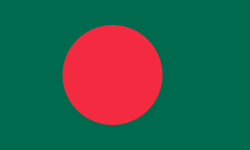 | 1972–present | National flag of Bangladesh | A red disc on top of a green field, offset slightly toward the hoist. [1] |
 | 1972–present | Flag of Bangladesh (vertical). |
| Flag | Date | Use | Description |
|---|---|---|---|
  | 1972–present | Used during national processions | Modified version of the national flag of Bangladesh, featuring a red circle on a green field, bordered with gold and inscribed at the top with the Quranic verse: "إِنَّ ٱللَّهَ عَلَىٰ كُلِّ شَىْءٍۢ قَدِيرٌۭ" (Indeed, Allah is over all things competent) from Surah Al-Baqarah [2:20]. [2] [3] |
| Flag | Date | Use | Description |
|---|---|---|---|
 | 1972–present | Presidential standard | The presidential seal on a dark red background [4] [5] |
 | 1972–present | Standard of the prime minister of Bangladesh | Seal of the prime minister on a dark red background |
 | 1996–2011, 2024–present | Standard of the chief adviser of Bangladesh | Seal of the chief adviser on a dark red background |
 | 1972–present | Flag of the Jatiya Sangsad (Parliament) | Seal of the Parliament on a Bangladesh green background |
 | 1972-present | Flag of the Speaker of the Jatiya Sangsad (Parlament) | Seal of the Speaker of the Parliament on a Bangladesh green background |
 | 1972–present | Flag of the Supreme Court of Bangladesh | Seal of the Supreme Court on a blue background |
 | 1972–present | Flag of the Chief Justice of Bangladesh | Seal of the Chief Justice of Bangladesh on a blue background |
 | 2010–present | Flag of the Chief Prosecutor of International Crimes Tribunal (Bangladesh) | Seal of the government of Bangladesh in a blue field with "Chief Prosecutor International Crimes Tribunal" written below |
 | 1972–present | Flag of Bangladesh Election Commission | Seal of the Bangladesh Election Commission on a teal background |
 | 1972–present | Flag of Chief Election Commissioner of Bangladesh | Seal of the Bangladesh Election Commission on a green background and "প্রধান নির্বাচন কমিশনার" (Chief Election Commissioner) written in Bengali on top |
| 2017–present [6] | Flag of Anti-Corruption Commission | Seal of the Anti-Corruption Commission on a sky blue background. |
| Flag | Date | Use | Description |
|---|---|---|---|
 | 1972–present | Civil ensign of Bangladesh (Bangladesh Merchant Navy) | A red ensign with the flag of Bangladesh in the canton influenced by the British Red Ensign [5] |
| Flag | Date | Use | Description |
|---|---|---|---|
 | 1972–present | Flag of the Bangladesh Armed Forces | A three-colored flag with the joint-services emblem in the center |
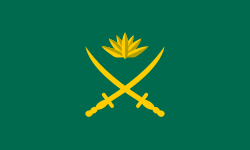 | 1972–present | Flag of the Bangladesh Army | The Army's badge on a green field |
 | 1972–present | Flag of the Bangladesh Air Force | A sky-blue ensign with the flag of Bangladesh in the canton, and the Air Force roundel in the fly |
 | 1972–present | Ensign of the Bangladesh Navy | A white ensign with the Flag of Bangladesh in the canton |
 | 1995 – present | Ensign of the Bangladesh Coast Guard | A light blue ensign with the flag of Bangladesh in the canton |
 | 1972–present | Standard of the Chief of Army Staff | Chief of Army Staff seal with 4 stars below on a green field |
| Link to image | 1972–present | Standard of the Chief of Naval Staff | The Navy's badge on a blue field [5] |
 | 1972–present | Standard of the Chief of Air Staff | Air Force Ensign of Bangladesh with 4 white stars |
 | 1972-present | Standard of the Captain | Standard of C-shape with Navy's Badge on a blue field |
 | 2010–present | Flag of the Border Guards Bangladesh (BGB) | The BGB's badge on a maroon field |
 | 1977–present | Flag of the Directorate General of Forces Intelligence (Armed Forces) | The DGFI's Insignia on a green field |
 | 1948 – present | Regimental Flag of East Bengal Regiment (Bangladesh Army) | EBR's Insignia on a dark maroon field |
 | 2016–Present | Regimental Flag of Para Commando Brigade (Bangladesh Army) | Para Commando Brigade Insignia on a dark purple field |
 | 1976–Present | Regimental Flag of President Guard Regiment (PGR) (Bangladesh Army) | PGR's Insignia on a red field |
 | 1972-present | Flag of 66th Infantry Division of Bangladesh Army in Rangpur Cantonment | 66th Infantry Division Insignia on a dark red field |
 | 1979-present | Flag of Bangladesh National Cadet Corps (BNCC) | Red, navy, and sky blue horizontal tricolor with the BNCC emblem in the center |
| Flag | Date | Use | Description |
|---|---|---|---|
 | 2025–present | Flag of the Bangladesh Police | Logo of Bangladesh Police on a dark blue field |
 | 1971–present | Flag of the Criminal Investigation Department | Logo of Criminal Investigation Department on a dark blue field |
 | 2025–present | Flag of IGP of the Bangladesh Police | |
 | 1981–present | Flag of the Bangladesh Fire Service & Civil Defence | Logo of Bangladesh Fire Service & Civil Defence on an orange field |
 | 1948–present | Flag of the Bangladesh Ansar-VDP | Ansar Insignia on a red-green field |
| 1972–present | Flag of Bangladesh Customs | Bangladesh Customs is their badge, outlined in white, on a dark blue background. | |
 | 1986–present | Flag of the Special Security Force | Insignia of Special Security Force on a dark green field |
| Flag | Date | Use | Description |
|---|---|---|---|
| Link to flag | 1972–present | Flag of the Bangladesh Scouts | Bangladesh Scouts logo on a dark green field |
| Link to flag | 1974–present | Flag of the Bangladesh Scouts Rover Region | Bangladesh Scouts logo on a dark red field with golden text below saying "Rover Region" |
| Link to flag | 1972- present [12] | Flag of the Bangladesh Scouts Railway Region | Bangladesh Scouts logo on a railway blue field with golden text below saying "Railway Region" |
| Link to flag | 1976- present | Flag of the Bangladesh Scouts Naval Region | Bangladesh Naval Scouts logo on a Navy blue field with golden text below saying "Naval Region" |
| Link to flag | 1977- present | Flag of the Bangladesh Scouts Air Region | Bangladesh Air Scouts logo on a Sky blue field with golden text below saying "Air Region" |
| Flag | Date | Use | Description |
|---|---|---|---|
 | Flag of Chakma Circle of Bangladesh |
| Flag | Duration | Use | Description |
|---|---|---|---|
Current | |||
 | 1971–present | Bangladesh Awami League | A green field containing four red stars, with a vertical red bar at the hoist. |
 | 1978–present | Bangladesh Nationalist Party | Two horizontal bands of red and green, with an eight-teethed black cogwheel (diameter approx. half of the flag's height) in the centre. Directly above the cogwheel lies a yellow rice plant below a yellow five-pointed star. |
 | 1986–present | Jatiya Party (Ershad) | Two vertical bands of green and red with a yellow star in the middle. |
 | 1990–present | Bangladesh Islami Front | A black field inscribed with the Arabic shahada with a vertical white bar at the hoist. |
 | 1980–present | Socialist Party of Bangladesh | |
 | 1980–present | Bangladesh Islami Chattra Sena | Two horizontal bands of black and green with a white vertical bar on the hoist side. |
 | Islami Chattra Sena | ||
 | 1980–present | Revolutionary Students Unity of Bangladesh | |
 | 1975–present | Bangladesh Jamaat-e-Islami | |
 | 1977–present | Bangladesh Islami Chhatrashibir | |
 | 1990-present | Islamic Front Bangladesh | |
 | 1972–present | Bangladesh Awami Jubo League | |
 | 1978-present | Bangladesh Jatiotabadi Jubo Dal | |
 | 1994-present | Bangladesh Awami Swechasebak League | |
 | 2000–present | Krishak Sramik Janata League | |
 | 1971–present | Bangladesh National Awami Party (NAP Muzaffar) | |
 | 2006–present | Bangladesh National Awami Party-Bangladesh NAP | |
 | Jatiya Samajtantrik Dal | A red field with a yellow ember in the middle. | |
 | 1990–present | Ganatantri Party | Three horizontal stripes of camarone, white and crimson. |
 | 1972–present | Parbatya Chattagram Jana Samhati Samiti | A vertical bicolour of white and red, charged with a yellow star centred on the white portion. |
 | 1971–present | Communist Party of Bangladesh | Red standard with a hammer and sickle on the top-left corner. |
 | 1967-present | Communist Party of Bangladesh (Marxist–Leninist) (Barua) | |
 | 1971–present | Jamiat Ulema-e-Islam Bangladesh | Nine horizontal stripes alternating black and white. |
 | 1952–present | Bangladesh Students' Union | |
 | 1995–present | Jatiya Gano Front | |
 | 1948–present | Bangladesh Chhatra League | |
 | 1979–present | Bangladesh Jatiotabadi Chatra Dal | |
 | 1980–present | Bangladesh Jatiotabadi Swechhasebak Dal | |
 | 1983–present | Jatiyo Chhatra Samaj | |
 | 2006–present | Liberal Democratic Party (Bangladesh) | |
 | 1976–present | Bangladesh Muslim League | Green standard with a star and crescent. |
| 2005-present | Bangladesh Tarikat Federation | ||
 | 2015–present | Trinomool BNP | |
 | 2007-present | Bangladesh Kalyan Party | |
 | 2004-present | Bikalpa Dhara Bangladesh | |
 | 2013-present | Bangladesh Congress | |
| 2017-present | Nationalist Democratic Movement | ||
| 1989-present | Bangladesh Zaker Party | ||
 | 2023-present | Bangladesh Supreme Party | |
 | 2021-present | Gono Odhikar Parishad | |
 | 2002-present | Ganosanhati Andolan | |
 | 2012-present | Nagorik Oikko | |
 | 2007-present | National People's Party | |
 | 1997-present | Bangladesh Sangskritik Muktijote | |
 | Bangladesh Citizens Alliance | ||
Former | |||
 | 1972-? | Jatiya Samajtantrik Dal | A horizontal bicolour of yellow and red. |
 | 1957-1967 | National Awami Party | Red standard. |
Other | |||
 | South Asian Communist Banner | Red standard with a large hammer and sickle in the centre. | |
| Flag | Date | Party | Description |
|---|---|---|---|
 | 1972–2006 | Shanti Bahini (armed wing) | A vertical bicolour of red and white, charged with a yellow star centred on the white portion. |
 | 1973–2006 | Bangabhumi | |
 | 1998-present | United People's Democratic Front | |
 | 2008-present | Kuki-Chin National Front | |
 | 1997–present | Zomi Revolutionary Army | A red field charged with a green cross with yellow borders that extend to the edges. |
| Flag | Date | Use | Description |
|---|---|---|---|
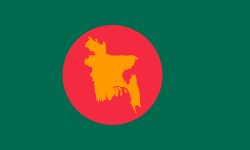 | 1971– 1972 | Flag of Provisional Government of the People's Republic of Bangladesh, used after independence too. | A flag with a green background, a red disk and a yellow map of the country in the middle [5] |
 | March – December 1971 | Flag of Mukti Bahini (Liberation Forces) | A flag with a red background, a white disk and a hand holding a rifle- bayonet in the middle. |
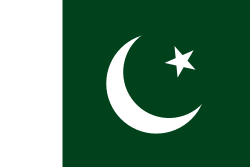 | 1947-1971 | Flag of Pakistan | Green flag with a white crescent and star on it, and a white strip to its left. See List of Pakistani flags for more. |
 | 1955-1971 | Flag of Governor of East Pakistan | |
 | 1803–1947 | Flag of the Presidency of Fort William (Bengal Presidency, later Bengal Province) | A Blue Ensign with the Union Flag at the canton, and the Bengal Presidency Emblem displayed in the fly. |
 | 1880–1947 | Flag of the British Raj: A civilian flag used to represent British India internationally. | A Red Ensign with the Union Flag at the canton, and the Star of India displayed in the fly. |
 | 1885–1947 | Flag of the Viceroy of India | The Union Jack with the insignia of the Order of the Star of India beneath the Imperial Crown of India. |
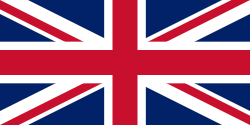 | 1858–1947 | The official state flag of the British Empire for use in India | The Flag of the United Kingdom. |
 | 1717–1757 | Flag of the Bengal Subah | A white flag with three yellow barrels and a yellow handled black sword. [13] |
 | 1717–1757 | Nawabs of Bengal war flag | [14] |
 | 1576–1858 | Flag of the Mughal Empire | Mughal Empire Alam flag that was primarily moss green. [15] |
 | 1352–1576 | Flag of the Bengal Sultanate according to Catalan atlas in 1375 | |
 | Flag of the Bengal Sultanate according to Empire of Armalet in "The book of knowledge of all kingdoms" in c. 1350s or c. 1385 | ||
 | 1231–1338 | Flag of the Delhi Sultanate | According to the Catalan Atlas the flag of the Delhi Sultanate was a grey flag with a black strip left of center. |